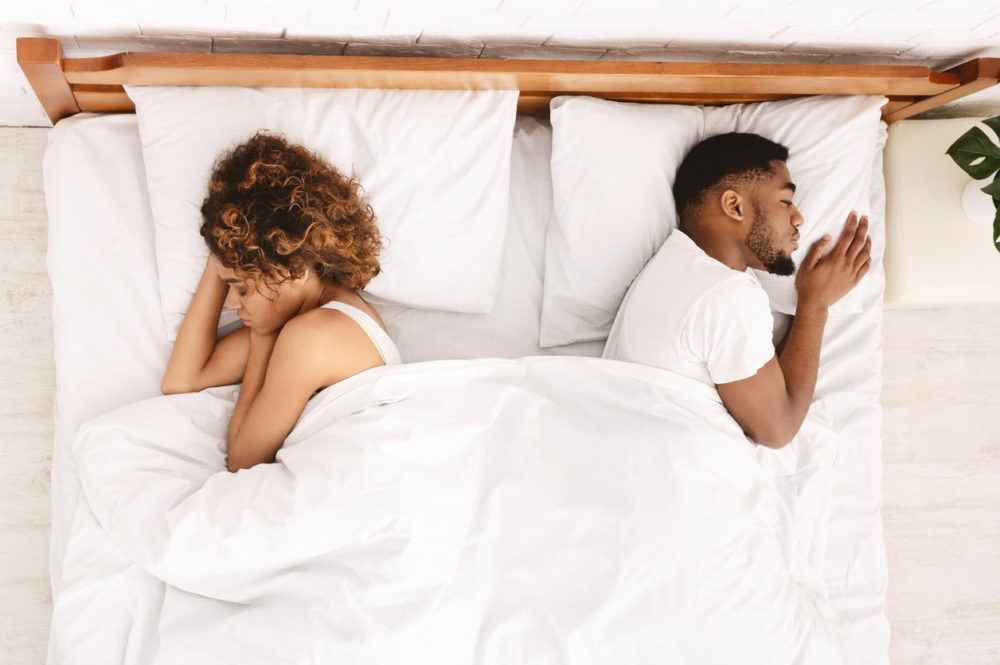When is it Time for a Sleep Divorce? Your Biggest Co-Sleeping Questions, Answered

Ever hear your friends or family complaining about their bed partners keeping them awake at night? It’s a commonly held belief that sleeping next to someone in bed yields poorer sleep. But is that true? Our sleep expert, Dr. Roy Raymann, explores the pros and cons of sleeping with a partner, and when you should consider a sleep divorce.
Do we sleep better with a partner?
The research on sleeping with partners still leaves much to be desired. This is typically because most sleep studies focus on just one person in bed at a time.
Of the research that does exist, the results are fairly inconclusive. While one study showed that sleeping with a partner resulted in the sleepers getting more deep sleep and sleeping longer, another study showed the single sleepers actually got more deep sleep.
What really matters is whether your bed partner is experiencing other sleep issues that could be keeping you awake as well.
“If your partner is experiencing insomnia, they may toss and turn a lot, causing you to wake up,” notes Dr. Raymann. “Similarly, those partners who snore may also cause a fair amount of disruptions through the night for their partner.”
What can I do if we have different sleep preferences?
In some cases, it’s merely a matter of finding a “balance” in your bedroom preferences. There are crafty workarounds to accommodate a few scenarios.
Mattress firmness: If one of you loves a soft mattress while the other prefers something firmer, you can find mattresses that have a different settings firmness for each side of the bed, but they are mostly custom made. For a less expensive, albeit less common unconventional, option, you can try a split King setup, using 2 Twin XL sized mattresses that allow for different firmness and thermal comfort levels.
Temperature: Setting an optimal temperature in the bedroom is a key element for good sleep. Our experts recommend setting your bedroom thermostat around 65 degrees F. But you’ll need to make sure you’re still comfortably warm when in bed. If you or your partner feels too cold at this temperature, you can try different blankets, duvets, or other covers to help optimize the thermal comfort for each person.
A safe bet for both is best to simply stick with best practices. Here are some simple areas you can address that can help you both sleep without the need for compromise
Light: If one of you is more sensitive to external light sources during sleep, it’s best to invest in removing or blocking all those extra sources of light. You’ll both benefit from it! Using blackout curtains is a great way to block outdoor light. If you’re on a budget, an eye mask can be a suitable alternative.
Sound: Similar to light sensitivity, if one of you is a light sleeper who wakes at any sudden sound disturbances, it’s better to address that problem for both sleeper’s sake. Firstly, try to remove or block any potential noise source. If the noise sources are beyond your control, try a sound machine that helps keep a steady soothing sound level rolling through the bedroom, so no sudden noises wake up either of you.
When is it time for a sleep divorce?
If you’ve tried everything you possibly can to get quality shut-eye with a partner next to you, but you are still unable to get the Zzzs you need, it might be time to consider a sleep divorce.
“This is really a last resort,” continues Dr. Raymann. “But if it does come down to a sleep divorce, it doesn’t have to be forever. You can try sleeping separately once a week, or just whenever you feel like you need a catch-up night.”
While sleeping alone may seem like a good idea at first, you may quickly discover that sleeping next to someone you love provides feelings of safety, comfort, and closeness which can be a powerful elixir for better sleep. Maybe love does conquer all?
Try it and see.
Have more questions about sleeping with a partner? Tweet us @sleepscore!